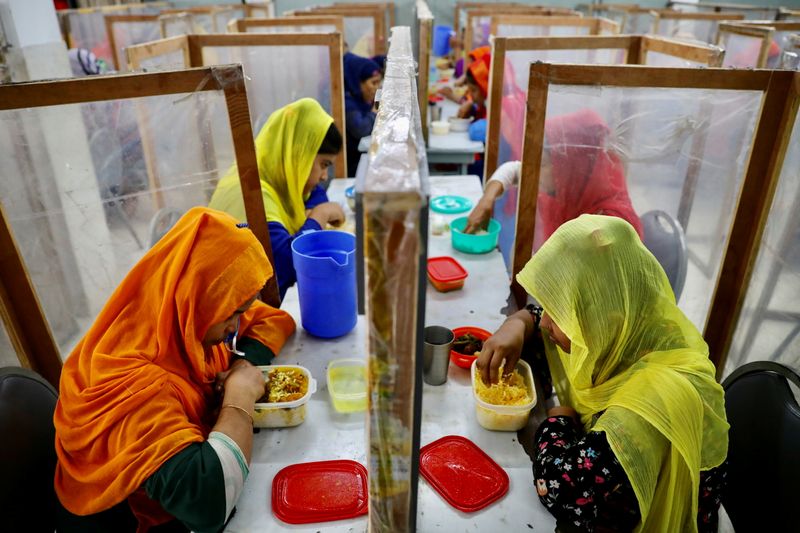By Ruma Paul and Victoria Waldersee
DHAKA (Reuters) -Major global retailers agreed on a two-year pact with garment workers and factory owners in Bangladesh, extending a pre-existing agreement that makes retailers liable to legal action unless their factories meet labour safety standards.
The statement, signed by the deal's deputy director Joris Oldenziel and representatives for UNI Global Union and IndustriALL Global Union, confirms the content of a copy of the pact, exclusively seen by Reuters earlier on Wednesday.
"This is a legally binding agreement between companies and trade unions to make ready-made garment (RMG) and textile factories safe," the statement said.
"The renewed agreement advances the fundamental elements that made the accord successful."
The original agreement, known as the Bangladesh Accord, was due to expire on Aug. 31. The new version comes into force on Sept. 1. and is named the International Accord for Health and Safety in the Textile and Garment Industry to reflect its wider reach.
Some 200 retailers signed up to the accord in 2013, including retail giants H&M, Inditex (MC:ITX), Fast Retailing's Uniqlo, Hugo Boss, and adidas. A list of those that have also signed up to the extension will be made available on Sept. 1, sources said.
A spokesperson for Uniqlo said they had not yet seen the new accord, but they "generally support a new binding agreement... that has independent oversight and can be expanded to other countries."
H&M, Inditex, Hugo Boss and adidas did not immediately respond to requests for comment.
The five-year accord, struck in the aftermath of the Rana Plaza collapse in 2013 that killed more than 1,100 garment workers, instituted an independent body that held thousands of inspections and banned unsafe factories from supplying its signatory buyers.
That helped to make some 1,600 factories safer for 2 million workers, labour activists say.
Under a transition deal agreed in 2018 after the original accord expired, a newly-formed body, the Ready-Made Garments Sustainability Council (RSC), which brings together unions, brands, and factory owners, took over the work of running factory inspections.
However, the RSC did not take over one portion of the accord - the ability for retailers to be tried in court in the country in which they are domiciled if they fail to meet their obligations, including cutting ties with factories that do not meet the accord's standards.
Signatories also agreed to discuss within six months to which countries the accord could be extended, with the aim of establishing it in at least one other country within two years, it said.
Negotiations over the accord's extension stalled in May when U.S. retailers resisted agreeing to the legally-binding aspect of the agreement, sources said.
Retailers, including Target (NYSE:TGT), Walmart (NYSE:WMT), VF Corp (NYSE:VFC), which did not want to sign the original accord in 2013 formed a parallel alliance with similar functions, but no legal powers of enforcement.
Those leading the talks had hoped to negotiate an extension that U.S. retailers would also be willing to adopt, sources said in May.
But Walmart told Reuters on Tuesday it was not part of the accord's extension. Target and VF Corp did not respond to requests for comment.
